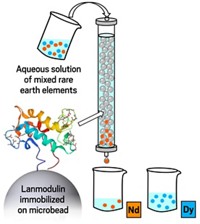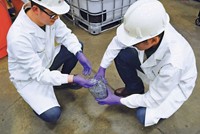Advertisement
Grab your lab coat. Let's get started
Welcome!
Welcome!
Create an account below to get 6 C&EN articles per month, receive newsletters and more - all free.
It seems this is your first time logging in online. Please enter the following information to continue.
As an ACS member you automatically get access to this site. All we need is few more details to create your reading experience.
Not you? Sign in with a different account.
Not you? Sign in with a different account.
ERROR 1
ERROR 1
ERROR 2
ERROR 2
ERROR 2
ERROR 2
ERROR 2
Password and Confirm password must match.
If you have an ACS member number, please enter it here so we can link this account to your membership. (optional)
ERROR 2
ACS values your privacy. By submitting your information, you are gaining access to C&EN and subscribing to our weekly newsletter. We use the information you provide to make your reading experience better, and we will never sell your data to third party members.
Environment
Recovering Neodymium From Steel Mill Slag
Study shows valuable rare-earth metal accumulates selectively in waste from scrap steel processing
by Mitch Jacoby
February 9, 2015
| A version of this story appeared in
Volume 93, Issue 6
Substantial amounts of the rare-earth element neodymium can be recovered from a previously untapped source—the waste stream from some types of steel mills, according to a report in Energy Technology (2015, DOI: 10.1002/ente.201402162). The tight supply of rare-earth minerals has made headlines in recent years because of the technological importance of these materials and export restrictions imposed upon them by China, the world’s largest supplier. Rare-earth metals are widely used to make magnets for electric motors in automobiles and other products. Commercial recycling operations recover the valuable metals from phosphors used in the lighting industry and from computer disk-drive magnets. But as H. M. Dhammika Bandara and Marion H. Emmert of Worcester Polytechnic Institute and coworkers point out, neodymium in automobile motors and household appliances, including refrigerators and air conditioners, currently is not recycled. Nor is it known in which end-of-life waste stream the metal ends up. By analyzing metal samples from shredding plants and waste from steel mills that process steel scrap, the team found that substantial amounts of neodymium (0.03% by weight) accumulate in the steel mill slag. The team did not detect other rare-earth metals in that source, suggesting that costly separation steps can be bypassed.





Join the conversation
Contact the reporter
Submit a Letter to the Editor for publication
Engage with us on Twitter